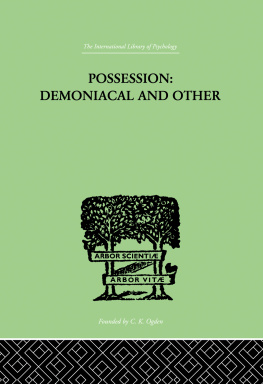THE ELISHAHAZAEL PARADIGM AND THE KINGDOM OF ISRAEL
BibleWorld
Series Editors: Philip R. Davies and James G. Crossley, University of Sheffield
BibleWorld shares the fruits of modern (and postmodern) biblical scholarship not only among practitioners and students, but also with anyone interested in what academic study of the Bible means in the twenty-first century. It explores our ever-increasing knowledge and understanding of the social world that produced the biblical texts, but also analyses aspects of the Bibles role in the history of our civilization and the many perspectives not just religious and theological, but also cultural, political and aesthetic which drive modern biblical scholarship.
The ElishaHazael Paradigm and the Kingdom of Israel
The Politics of God in Ancient Syria-Palestine
Hadi Ghantous
First published 2013 by Acumen
Published 2014 by Routledge
2 Park Square, Milton Park, Abingdon, Oxon OX14 4RN
711 Third Avenue, New York, NY 10017, USA
Routledge is an imprint of the Taylor & Francis Group, an informa business
Hadi Ghantous, 2013
This book is copyright under the Berne Convention.
No reproduction without permission.
All rights reserved. No part of this book may be reprinted or reproduced or utilised in any form or by any electronic, mechanical, or other means, now known or hereafter invented, including photocopying and recording, or in any information storage or retrieval system, without permission in writing from the publishers.
Notices
Practitioners and researchers must always rely on their own experience and knowledge in evaluating and using any information, methods, compounds, or experiments described herein. In using such information or methods they should be mindful of their own safety and the safety of others, including parties for whom they have a professional responsibility.
To the fullest extent of the law, neither the Publisher nor the authors, contributors, or editors, assume any liability for any injury and/or damage to persons or property as a matter of products liability, negligence or otherwise, or from any use or operation of any methods, products, instructions, or ideas contained in the material herein.
ISBN: 978-1-84465-739-1 (hardcover)
British Library Cataloguing-in-Publication Data
A catalogue record for this book is available from the British Library.
Typeset in Warnock Pro by JS Typesetting Ltd
CONTENTS
We shall remember Constantinople and the Bosporus the colossal magnificence of Baalbec the Pyramids of Egypt the prodigious form, the benignant countenance of the Sphynx Oriental Smyrna sacred Jerusalem Damascus, the Pearl of the East, the pride of Syria, the fabled Garden of Eden, the home of princes and genii of the Arabian Nights, the oldest metropolis on earth, the one city in all the world that has kept its name and held its place and looked serenely on while the Kingdoms and Empires of four thousand years have risen to life, enjoyed their little season of pride and pomp, and then vanished and been forgotten!
Mark Twain, Innocents Abroad
The Aramaean kingdom of Damascus and its most famous king, Hazael, have been the subject of numerous studies, especially since Hazael has been suspected to be behind the most important text relative to the Bible and to Ancient Israel discovered at the end of the twentieth century CE, the so-called Tel Dan (Tell el-Qadi) Inscription. In spite of the number and quality of these studies, I believe that the influence of Hazael on biblical literature is not exhausted. More light can be cast when, instead of considering biblical texts relevant to the history of ninth century BCE Israel from the standpoint of Jerusalem, the onlooker sets him/herself further north, from the standpoint of Damascus and Assyria.
To work out the extent of Hazaels influence on the biblical literature, I present, first, the current state of research concerning this king and his empire through surveying some recent studies of the history of Israel and of Aram-Damascus. I then examine the relevant extra-biblical sources, inscriptions and archaeological data. Finally, I examine passages in the books of Kings and the Twelve Minor Prophets to study the interaction between the Bible and history.
At this point, a quick reminder of some key points is in order. The Aramaeans were a group of semi-nomadic tribes in Syria/Mesopotamia during the second half of the second millennium BCE (Kottsieper 2009: 398). They are first mentioned in Mesopotamian texts around 1200 BCE. They occupied the area of the middle Euphrates, the Orontes River and southern Syria, and thus filled the vacuum left by the collapse of the Hittite Kingdom in northern Syria (Kelle 2007: 1617). Although the term Aramaean may convey a general notion of ethnic unity, the Aramaeans in fact developed what were practically independent city-states (Joffe 2002: 446). A first wave of Aramaean city-states included Beit-Maacha and Geshur. A second wave included Beit-Rehob, Zoba and Damascus.
In spite of the existence of other Aramaean entities in Syria, the Zakkur stele and the books of Kings associated the term Aram mostly with the Kingdom of Damascus. The Bible reserves the name Damascus for the capital of the Kingdom of Aram-Damascus. The Assyrian texts also distinguish between the city and the Kingdom.
1.1 THE DISCOVERY OF THE EMPIRE OF HAZAEL
Besides Egypt and the Philistine cities, the kingdom of Damascus occupies a prominent place in the Bible.1 The Assyrian records also reveal the importance of Aram-Damascus on the regional scale. Scholars interested in the history of Israel and of the ancient Near East have long been aware that Hazaels reign marked the apex of Aram-Damascus but it is only in the past two decades that historians realized that Hazaels power far exceeded the confines of the Aramean kingdoms that preceded Hazaels consolidation of Aram-Damascus.
Andr Lemaires article Hazal de Damas, roi dAram marked a major step in the recovery of Hazaels regional stature. Lemaire (1991a: 1046) argues that the available sources (Aramaic, Assyrian, biblical and archaeological) reveal that Hazael built an empire that controlled the entire area west of the Euphrates. Lemaire distinguishes different degrees of Damascene control over Syria-Palestine during the reign of Hazael, ranging from direct control to various degrees of vassalage. Lemaire is cautious about using the term empire for Aram-Damascus under Hazael, but he concludes that Hazael was truly the Great King of Syria-Palestine (ibid.: 105).
Two years after Lemaires article, a fragment of an Aramaic inscription was discovered at Tel Dan (Biran & Naveh 1993: 8198), followed by two smaller fragments a year later. The three fragments constitute the remains of the so-called Dan Stele (Biran & Naveh 1995: 118) that I prefer to consider as an inscription rather than a stele (see 3:4). Although Hazael is not mentioned explicitly in the fragments of the Tel Dan Inscription, the discovery has turned Hazael into the key figure for the study of the history of Syria-Palestine during the second half of the ninth century BCE. In turn, this new awareness of the role of Damascus impacted biblical historiography.







